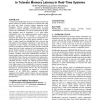Free Online Productivity Tools
i2Speak
i2Symbol
i2OCR
iTex2Img
iWeb2Print
iWeb2Shot
i2Type
iPdf2Split
iPdf2Merge
i2Bopomofo
i2Arabic
i2Style
i2Image
i2PDF
iLatex2Rtf
Sci2ools
CASES
2004
ACM
2004
ACM
Safely exploiting multithreaded processors to tolerate memory latency in real-time systems
A coarse-grain multithreaded processor can effectively hide long memory latencies by quickly switching to an alternate task when the active task issues a memory request, improving overall throughput. However, dynamic switching cannot be safely exploited to improve throughput in hard-real-time embedded systems. The schedulability of a task-set (guaranteeing all tasks meet deadlines) must be determined a priori using offline schedulability tests. Any computation/memory overlap must be statically accounted for. We develop a novel analytical framework that bounds the overlap between computation of a pipeline-resident-task and on-going memory transfers of other tasks. A simple closed-form schedulability test is derived, that only depends on the aggregate computation (C) and memory (M) components of tasks. Namely, the technique does not require specificity regarding the location of memory transfers within and among tasks and avoids searching all task permutations for a specific feasible sch...
Related Content
| Added | 30 Jun 2010 |
| Updated | 30 Jun 2010 |
| Type | Conference |
| Year | 2004 |
| Where | CASES |
| Authors | Ali El-Haj-Mahmoud, Eric Rotenberg |
Comments (0)

